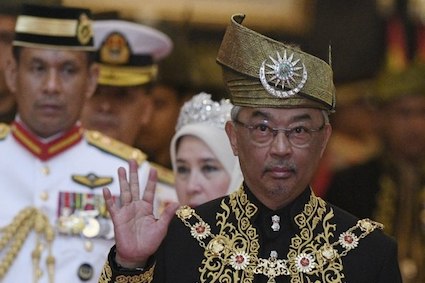In appointing PM, Agong is not tied to mathematical formula, says lawyer

(FMT) – The Yang di-Pertuan Agong cannot be expected to look at a precise mathematical formula in appointing a prime minister from among the 222 Dewan Rakyat members, constitutional lawyer Bastian Pius Vendargon said.
He said one had to do a careful reading of Article 43 (2)(a) of the Federal Constitution which states that the King appoints a prime minister who, in his judgment, is likely to command the confidence of the majority.
“So,the King can use his discretion to form an opinion as to who has the majority support and it does not mean it must be 50% or more,” he said.
Vendargon said this in response to Wangsa Maju MP Dr Tan Yee Kew stating that PKR MPs had signed a declaration for their president Anwar Ibrahim to be made the 8th prime minister.
Amanah’s Khalid Samad has also openly called on Dr Mahathir Mohamad not to continue as prime minister and to give way to Anwar.
It is unclear whether Khalid’s call is reflective of a decision taken by Pakatan Harapan’s presidential council last night.
The coalition consists of the DAP with 42 MPs, PKR 39 and Amanah 11, which totals 92.
Earlier, it was reported that the DAP had stated its support for Mahathir to lead a revived ruling coalition following the collapse of the PH government this week.
Vendargon said support for the newly appointed prime minister could either increase or decrease and the final test was on the floor of the Dewan Rakyat.
He said this had occurred in the Indian Parliament and its state legislatures.
Vendargon said a backbencher could initiate a confidence motion or the opposition could move a no-confidence motion against the prime minister.
“It is at the House that the (Malaysian) prime minister must get at least the support of 112 MPs to remain in office to administer the nation together with his Cabinet.
“Suppose, he is defeated in a motion of no confidence, the prime minister then reports to the King. At this juncture, he can request the monarch to dissolve the Parliament for a snap election,” he said.
Vendargon said the prime minister must tender his resignation should the King refuse a dissolution.
In such a case, he said, the King would repeat the process under Article 43 (2)(a).
Meanwhile, former Federal Court judge Gopal Sri Ram said no provision in the constitution allowed the King to dissolve the Dewan Rakyat in the present political impasse.
Sri Ram said he was informed that some quarters had been giving such advice to the King.
“The Parliament can only be dissolved upon the Agong receiving the advice of the prime minister under Article 40(3) of the constitution,” he said.
However, lawyer Lim Chee Wee said the current process being undertaken by the King to interview each MP was constitutionally correct.
“If the King determines that no one person satisfies the threshold, then the monarch may dissolve Parliament,” said Lim, who is also a former Malaysian Bar president.

